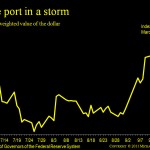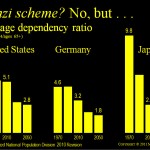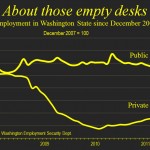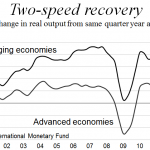Martin Wolf, much-honored chief economics commentator of the Financial Times, has been my beacon during the financial crisis. So it is especially discouraging to read his June 6, 2012, column, headlined “Panic has become all too rational”. Wolf argues that the advanced economies are caught in a “contained depression,” that [continue reading . . . ]
Uh, oh, indeed. The Financial Times reports in its May 31 edition that yields on two-year German bonds on May 30 fell to zero for the first time. As the Times put it, investors are willing to lend to Berlin for two years for no return. The yield on the [continue reading . . . ]
I think a lot about China these days. For nearly a year, a copy of the USA weekly edition of the China Daily, the official newspaper of China’s communist party, has landed on my doorstep every Friday, unbidden. It is a sample, probably related to my Wall Street Journal subscription. [continue reading . . . ]

Gas at $4.00 a gallon? Gold at nearly $1,800? One of the reasons is that the value of the U.S. dollar has fallen by 38% in a decade, measured against the currencies of major trading partners. The collapse of the dollar to 97-lb. weakling status has been a drag if [continue reading . . . ]

Is Social Security a Ponzi scheme, as Texas Gov. and GOP presidential candidate Rick Perry labeled it during the GOP candidates’ debate Sept. 7? The answer is “No.” Charles Ponzi gave money collected from early suckers attracted by phony promises of high returns to new suckers after taking a cut. [continue reading . . . ]

Today’s brutal report on the labor market from Uncle Sam reminded me that the Seattle Times (where I once worked) the other day conjured the image of vast expanses of state office space bereft of employees (here’s a link to the article). State government employment has declined two years in [continue reading . . . ]
On KUOW’s Weekday program July 6, I suggested Washington’s tourist industry tax itself to fund tourism promotion now that the state’s puny effort (that spawned such forgettable campaigns as “Say WA”) have dried up (here’s a link to a New York Times piece that appeared in the Seattle Times). I [continue reading . . . ]
The bad news is that the United States – indeed, much of the developed world – is in the midst of a “contained depression.” The private sector continues to de-leverage. Unemployment remains high. Pay for most is static or declining. Deflation remains a bigger threat than inflation. Depressions eventually end, [continue reading . . . ]
China has become enormously important to the Pacific Northwest economy. Marple’s Letter reports that China was the primary driver behind a 41% jump in Douglas Fir log exports from the Pacific Northwest last year. It is great news for timber owners — log prices are sharply higher — but bad [continue reading . . . ]
Oregon would have to increase taxes on each household by more than $2,000 each year for several years to fully fund the pension obligations of its public employees (those working for states, counties, cities, school districts, etc). By this measure, only in New Jersey and New York are the burdens [continue reading . . . ]
Now you know. It is all right there on the front page of today’s New York Times, and in fewer than 300 words in this edited excerpt: Workers are getting more expensive while equipment is getting cheaper, and the combination is encouraging companies to spend on machines rather than people. [continue reading . . . ]

It has been nearly four years since the collapse of two Bear Stearns hedge funds (June 2007) signaled the start of the global financial crisis, not quite three since the failure of Lehman Brothers Holdings (Sept. 14, 2008) sent banks into a panic and pushed the tottering global economy off [continue reading . . . ]